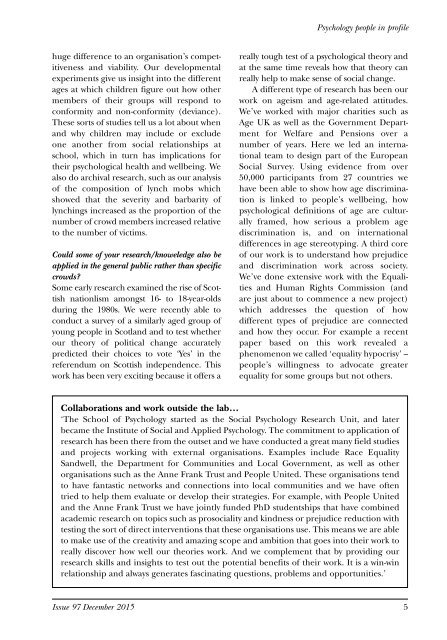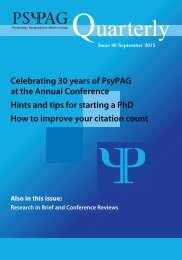Social Psychology Special Issue
XFCu7
XFCu7
Create successful ePaper yourself
Turn your PDF publications into a flip-book with our unique Google optimized e-Paper software.
<strong>Psychology</strong> people in profile<br />
huge difference to an organisation’s competitiveness<br />
and viability. Our developmental<br />
experiments give us insight into the different<br />
ages at which children figure out how other<br />
members of their groups will respond to<br />
conformity and non-conformity (deviance).<br />
These sorts of studies tell us a lot about when<br />
and why children may include or exclude<br />
one another from social relationships at<br />
school, which in turn has implications for<br />
their psychological health and wellbeing. We<br />
also do archival research, such as our analysis<br />
of the composition of lynch mobs which<br />
showed that the severity and barbarity of<br />
lynchings increased as the proportion of the<br />
number of crowd members increased relative<br />
to the number of victims.<br />
Could some of your research/knoweledge also be<br />
applied in the general public rather than specific<br />
crowds?<br />
Some early research examined the rise of Scottish<br />
nationlism amongst 16- to 18-year-olds<br />
during the 1980s. We were recently able to<br />
conduct a survey of a similarly aged group of<br />
young people in Scotland and to test whether<br />
our theory of political change accurately<br />
predicted their choices to vote ‘Yes’ in the<br />
referendum on Scottish independence. This<br />
work has been very exciting because it offers a<br />
really tough test of a psychological theory and<br />
at the same time reveals how that theory can<br />
really help to make sense of social change.<br />
A different type of research has been our<br />
work on ageism and age-related attitudes.<br />
We’ve worked with major charities such as<br />
Age UK as well as the Government Department<br />
for Welfare and Pensions over a<br />
number of years. Here we led an international<br />
team to design part of the European<br />
<strong>Social</strong> Survey. Using evidence from over<br />
50,000 participants from 27 countries we<br />
have been able to show how age discrimination<br />
is linked to people’s wellbeing, how<br />
psychological definitions of age are culturally<br />
framed, how serious a problem age<br />
discrimination is, and on international<br />
differences in age stereotyping. A third core<br />
of our work is to understand how prejudice<br />
and discrimination work across society.<br />
We’ve done extensive work with the Equalities<br />
and Human Rights Commission (and<br />
are just about to commence a new project)<br />
which addresses the question of how<br />
different types of prejudice are connected<br />
and how they occur. For example a recent<br />
paper based on this work revealed a<br />
phenomenon we called ‘equality hypocrisy’ –<br />
people’s willingness to advocate greater<br />
equality for some groups but not others.<br />
Collaborations and work outside the lab…<br />
‘The School of <strong>Psychology</strong> started as the <strong>Social</strong> <strong>Psychology</strong> Research Unit, and later<br />
became the Institute of <strong>Social</strong> and Applied <strong>Psychology</strong>. The commitment to application of<br />
research has been there from the outset and we have conducted a great many field studies<br />
and projects working with external organisations. Examples include Race Equality<br />
Sandwell, the Department for Communities and Local Government, as well as other<br />
organisations such as the Anne Frank Trust and People United. These organisations tend<br />
to have fantastic networks and connections into local communities and we have often<br />
tried to help them evaluate or develop their strategies. For example, with People United<br />
and the Anne Frank Trust we have jointly funded PhD studentships that have combined<br />
academic research on topics such as prosociality and kindness or prejudice reduction with<br />
testing the sort of direct interventions that these organisations use. This means we are able<br />
to make use of the creativity and amazing scope and ambition that goes into their work to<br />
really discover how well our theories work. And we complement that by providing our<br />
research skills and insights to test out the potential benefits of their work. It is a win-win<br />
relationship and always generates fascinating questions, problems and opportunities.’<br />
<strong>Issue</strong> 97 December 2015 5



